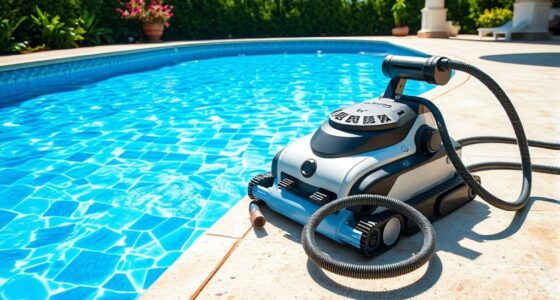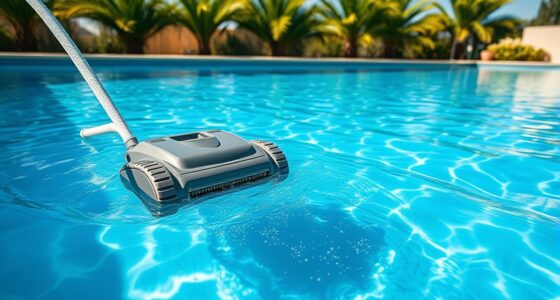Descalers use different acids to dissolve mineral buildup like limescale. Citric acid, derived from citrus fruits, is gentle and eco-friendly, ideal for light to moderate deposits. Lactic acid, found in dairy products, also works well for softening buildup. More potent options include phosphoric or sulfamic acids, suitable for heavy deposits but requiring careful handling. Understanding these options helps you choose the right product—keep exploring to learn how each works and which is best for your needs.
Key Takeaways
- Descalers use acids like citric, lactic, phosphoric, or sulfamic to dissolve mineral deposits such as limescale.
- Citric acid is a natural, eco-friendly option effective against calcium carbonate buildup.
- Inorganic acids act faster and are suitable for heavy deposits but require careful handling due to corrosiveness.
- Combining acids with chelating agents or enzymes can enhance descaling efficiency and safety.
- Selecting the right descaler depends on buildup severity, appliance type, and preference for natural or chemical solutions.

Many descalers rely on chemical reactions to dissolve limescale. Citric acid, for example, is a popular natural option. Derived from citrus fruits, it’s effective at breaking down calcium carbonate, the primary component of limescale. You simply mix a solution of citric acid with water and run it through your appliance. It’s gentle, environmentally friendly, and safe for most appliances. Lactic acid-based descalers work similarly but tend to be less common; they’re often found in specialized cleaning products. These acids chemically react with mineral deposits, turning them into soluble substances that can be rinsed away easily. Additionally, understanding the chemical reactions involved can help you choose the most effective descaler for your specific needs. There are also inorganic descalers that contain acids like phosphoric or sulfamic acid. These tend to be stronger and faster-acting, making them suitable for heavy buildup. However, they require careful handling because their concentrated forms can be corrosive or irritating to your skin and eyes. You’ll want to follow the instructions precisely to avoid damage to your appliances or yourself. Some commercial descalers combine multiple acids or include other agents to enhance their effectiveness or to neutralize the acidity after cleaning. In addition to acids, some descalers utilize enzymes or chelating agents. Enzymatic descalers break down organic residues, which are less common in mineral buildup but can occur in certain appliances. Chelating agents bind to minerals like calcium and magnesium, effectively sequestering them and preventing further buildup. These are often used in more eco-friendly products or in combination with acids to boost cleaning power. Choosing the right descaler depends on your appliance, the severity of the buildup, and your preference for natural vs. chemical solutions. Natural options like citric acid are generally safer and more environmentally friendly, but may require longer contact time or repeated applications for heavy deposits. Stronger chemical descalers work faster but demand caution during use. Understanding the ingredients and how they work helps you make informed decisions, ensuring your appliances stay clean, efficient, and long-lasting.
Frequently Asked Questions
Can Descalers Damage My Appliance Over Time?
Descalers can damage your appliance if you use the wrong type or overuse them. Some harsh chemicals may corrode sensitive parts or degrade seals over time. To prevent damage, follow the manufacturer’s instructions carefully, use recommended descalers, and don’t overdo it. Regular, proper descaling helps maintain your appliance’s efficiency without risking long-term harm. Always choose a descaler suitable for your specific appliance to guarantee safety and longevity.
Are Natural Descalers as Effective as Chemical Ones?
Think of natural descalers like gentle rain easing away stubborn grime; they can be just as effective as chemical ones when used properly. I once cleaned my kettle with lemon juice, and it looked brand new. Natural options often contain acids that break down deposits without harsh chemicals, making them safe for your appliances and environment. With patience, you’ll find they work well, and you’ll feel good about choosing eco-friendly solutions.
How Often Should I Use a Descaler?
You should use a descaler every 1 to 3 months, depending on your water hardness and usage. If you notice reduced appliance performance or hear unusual noises, it’s time to descale. Regular descaling prevents buildup and keeps your appliances running efficiently. Always follow the manufacturer’s recommendations, and consider more frequent descaling if you live in a hard water area or use your machine daily.
Is Descaling Necessary for All Types of Water?
No, descaling isn’t necessary for all water types. If you have soft water, you likely won’t need to descale often, if at all. However, if your water is hard, with high mineral content, descaling becomes essential to prevent buildup that can damage appliances and reduce efficiency. Check your water hardness, and descale as needed—typically every few months—to keep your appliances running smoothly.
What Safety Precautions Should I Take When Using Descalers?
When using descalers, you should read labels carefully, wear gloves and eye protection, and work in a well-ventilated area. Always follow the manufacturer’s instructions, keep descalers away from children and pets, and avoid mixing different chemicals. Rinse thoroughly after descaling, and dispose of any leftovers responsibly. By taking these precautions, you safeguard yourself, your environment, and ensure the descaling process is safe and effective.
Conclusion
Now that you understand the different types of descalers, you’re better equipped to tackle lime and mineral buildup. Think of these solutions as your trusty knights, defending your appliances from the corrosion of time. With the right choice, you’ll keep your machines running smoothly, much like a well-tuned orchestra. So, embrace these powerful allies, and let your appliances enjoy a long, harmonious life—free from the villainous grip of scale buildup.









